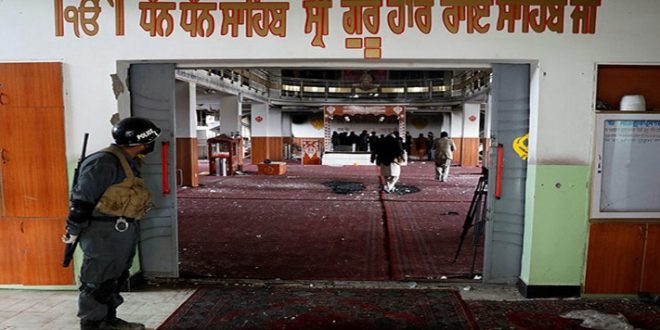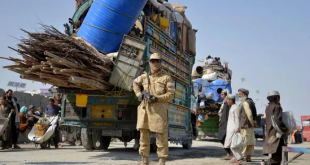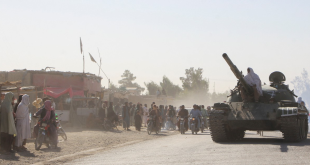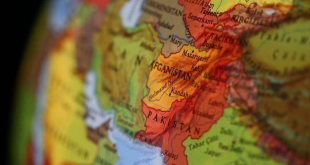AT News
KABUL: Harindra Singh alongside his family was worshiping in a gurdwara (Sikh temple) when gunmen stormed the religious place and opened fire on the worshippers. Singh says his family members were in front of his eyes.
“I lost my father, wife and daughter in the attack on the Shorbazar gurdwara,” Singh said, adding that he would never forget the attack that ruined his life.
In the morning of March 25, 2020, several Daesh terrorists staged attack on the Sikh temple in Police District 1 of Kabul city, killing 25 and wounding tens of other worshippers.
Singh said that the scene of the attack that took his family has caused trauma for him and. “My daughter was calling me. ‘Father, save me!’ Before I took her, the evil men opened fire and killed both my daughter and my wife. It is a big and unforgettable trauma. My wife was 36 years old and my daughter was just about four.”
He is just one of the hundreds of Afghan Sikh and Hindu minority who have lost their beloved ones in the gurdwara attack. He is now living in India as with his two children and mother as refugees. “My mother and I were wounded. We came here for treatment. My daughter, father, wife, father in-law and nephews, they all were killed,” he said. “We have nothing here. We lost everyone and everything in that cruelty attack.”
Rahendra Kaur, 45, is another Afghan Sikh who left Afghanistan for India because of security threats. He lost many of his relatives in the last year’s attack. “We may find onion and bread to eat but at least we live in peaceful condition and do not fear of losing our lives.”
Daesh first emerged in 2015 along the Durand Line in the eastern province of Nangarhar. Prior to the March attack, the terrorist group attacked a group of the Hindus and Sikhs in Jalalabad, the capital province of Nangarhar in 2018, killing at least 19 people and wounding several others.
Fari Kohar lost her father Rahul Singh in the attack. Her family migrated to India after the killing of her father. “The security is deteriorated, everyday; we wake up with fear of what will happen. When we go out, don’t know if we will return back home safe or not.” She said that she would join her family after she finishes school.
The Afghan Sikhs and Hindus are helped by the Sikh donation organizations based in abroad to receive a short time visa and then refer to the United Nations High Commissioner for Refugees (UNHCR) for the permanent visa. Although, the Sikhs and Hindus had previously sought the foreign countries’ asylum, their numbers have gone high after the March attack.
Jaggat Singh, 52, is from eastern province of Paktia and now lives in India with his family. Singh said that he fled Afghanistan after some powerful individuals forced him to give his shop to them. “Until 1996, we were in Kabul but they took my shop from me and I was forced to come to India during the Taliban regime. When I went back in 2007 to take my shop, they didn’t give it to me, and in 2015 again I went to take my shop, they had built a hotel on the land of my shop,” he said, without clarifying about the person or group who took his property.
A UNHCR report said that the Afghan Sikhs and Hindus were allowed to live under restrictions on their worship in pubic during the Taliban regime. They were ordered to wear particular clothes with yellow marks to distinguish them from their Muslim country-fellows.
Taliban denied being behind the Kabul temple attack.
In June 2020, 20 US senators in a letter to the then secretary of state, Mike Pompeo asked him to provide support to the Afghan Sikhs and Hindus being threatened by the Daesh terrorist group. They also called for asylum for this ethnicity.
Prior to that, Canada announced to provide asylum for them. The Hindustan Times said in a report that the Canadian defense minister Harjit Singh stressed on providing asylum for the Afghan Sikhs and Hindus due to the security threats.
Sunny Sign, who has a herbal shop in Kabul, said that he hoped the US and Canada take tremendous steps for transferring the Afghan Sikhs and Hindus not only from Afghanistan but also from India. “Racism has been surged towards us and insecurity also intensified and many of our relatives left us and gone. I also want to go but not to India or Pakistan, we hope as the US Senators and Canada promised help us and give us asylum and even to those who live in India.”
But the US and Canada are yet to bring the pledges into practice. “Days after the suicide attack on us, Canada announced that it will give asylum to Afghan Sikhs and Hindus. Canada and US told us that we should go to another country for the procedure. But unfortunately, they do not ask about us and there is no progress,” said, Harrindar Singh.
The Afghanistan Independent Human Rights Commission said that the Sikh and Hindu minorities face serious problems in Afghanistan. “They are treated with racism for their language, ethnicity and religion,” said, Zabiullah Farhang, director of media affairs of the commission. “This is why they don’t feel secure here and secondly the high level of insecurity posing serious concerns among them.”
Tariq Arian, spokesman for the ministry of interior said the government was in contact with their representatives regarding their security. “We are in contact with their representatives in the parliament to eliminate threats they are facing with,” he said, but didn’t provide details how to remove threats.
Sunny Singh who runs a herbal medicine shop blames the government for failing to provide tight security for them. “We want to have security, we want to have school. Not a separate school but a joint school with our Muslim brothers. We don’t have lands and homes. The families are living in temples.”
Narendra Singh Khalsa, a representative of the Sikhs and Hindus minority in the lower house of the parliament refrained from providing the exact number of Sikhs and Hindus to prevent the further security threats to them. “The government sticks supportive to all Hindus and Sikhs and it met all of our needs; those who left Afghanistan; it was their personnel choice.”
According to a European migration service organization, around 700,000 Sikhs and Hindus were living in Afghanistan 1970s and the number was dropped to 200,200 in 1992. A large part of them migrated from Afghanistan except a few families living in Kabul, Nangarhar and Ghazni province.
According to Reuters News Agency, in late 980, more than 500,000 Sikhs and Hindus lived in Afghanistan, who came to the country with the Britain Empire in 1900s.
Harindra Singh said that the elders of his family were often narrating the peaceful and solidarity life they had in Afghanistan alongside with other ethnics of the society.
 Afghanistan Times Latest News and Analysis from Afghanistan and the Region
Afghanistan Times Latest News and Analysis from Afghanistan and the Region




